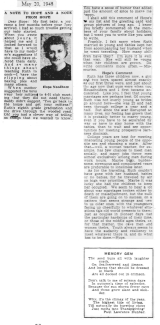Dear Hope: My first baby, a boy, came a few months before your Joey arrived. I had so much trouble getting our baby started. When you wrote about yours, it helped me and I looked forward to that as I would have to my mother's suggestions if she could have offered them daily. And so many things about teaching Ruth to cook -- I have the clipping about baking pies and many others.
When mother suggested the boys wear their mittens to 4-H club meeting (but they did not need them), daddy didn't suggest, "You go back to the house and get your mittens!" Ruth's eighth grade graduation and the drive through the wooded road. Oh! you had a clever way of telling us things that we wanted to know. You have a sense of humor that added just the amount of spice to make me happy.
I shall add this comment of Hope's to my list and the greeting card and group pictures of long ago. I know you briefly commented on the members of your family about holidays, but I want you to write like you used to write.
Frankly, I felt sorry when Ruth married so young and babies kept her from accompanying her husband when he went traveling. How many children have they? I'm sure it is well that way. She will still be young when her children are grown. Do write comments more often. --Missourian.
Hope's Comment
Ruth has three children now, a girl and two boys, spaced almost exactly as our first three were, and just about the age now that ours were when you Householders and I first became acquainted. Like you, I feel that young marriages are perhaps best. Of course, Ruth was not overly young as brides go around here -- she was 22 and had been through college a year and a half. But since the war disrupted so many lives, my feeling has grown that it is probably better to marry young, even if you have to be separated by war or have to stay home with the babies, than to wait and see opportunities for meeting prospective partners diminish.
College years are best for meeting interesting young people of the opposite sex and choosing a mate. After that -- well, a woman teacher, for example, has few chances to meet men socially, and many jobs throw men almost exclusively among men during work hours. Maybe busy, burdensome, strenuous and complicated years are preferable to loneliness later.
As for the traveling, Ruth couldn't have gone with her husband, babies or no babies, for he traveled by air on high war priorities. Maybe it was lucky she had the chilren to keep her occupied. We seem to hear a lot about war marriages broken either by death or maladjustment, but the bulk of them are going on to success, on a pattern that seems strange and new to us older ones, with the youngsters facing up cheerfully to whatever situations this old world presents to them; just as couples in pioneer days met the particular hardships of their time, or those of the middle ages theirs, or, for that matter, the cave men and women theirs. Youth always seems to have the audacity and resiliency to meet whatever there is, and do what has to be done. -- Hope.
Memory Gem
The seed burs all with laughter crack,
On deatherweed and jimson.
And leaves that should be dressed in black
Are all decked out in crimson.Don't talk to me of solemn days
In autumn's time of splendor,
Because the sun shows fewer rays
And these grow slant and slender.Why, it's the climax of the year,
The highest tide of living.
Till naturally its bursting cheer
Just melts into Thanksgiving!Paul Laurence Dunbar.

